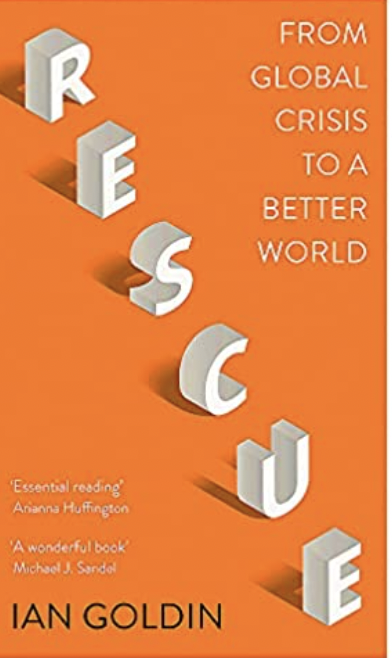
Covid-19 killed millions already, hundred of millions of people are impoverished, and economic prospects across are being ruined, with death and recession to forefront.
Rescue from Global Crisis is about how Covid19 rescue humanity.
Ian Goldin, professor of globalisation at the University of Oxford, details an optimistic vision of the future after Covid-19 which has destroyed global norms, by creating an unprecedented resonance in the human experience , the pandemic has defined a new era,, as for the first time world is sharing the same experience at the same time. The pandemic has given his case fresh urgency -and opportunity. He believes Covid 19 crisis can create opportunities for change, just as the second World War forged the ideas behind Beveridge report published in 1942, which laid the foundations for the welfare state alongside a host of other social and economic reforms, changing the world for the better.
The faceless foe may have crated a moment when human look around themselves and realise that we are all in this together.
Humanity needs to be rescuing as it is on the road to ruin.
National policies are producing more woes for the woeful, and more wealth for the wealthy, and this rising inequality will lead to population and protectionism that accelerates a vicious cycle of slower growth and more inequality. Globally, failure to radically reform the system and bolster co-operation will lead to future pandemics, rising geopolitical tensions , escalating risks of war, and environmental disasters.
He begins with a series of briefings on humanity ‘s pathway and updates on how the pandemic has accelerated or altered trajectories.
This updated perils from the undermining of democracy to climate change , the crisis in mental health to rising debts makes this book an essential read for all.
How the pandemic has also opened a window of opportunity for rescuing humanity , in three ways.
First and foremost it had altered citizens’ views on the status quo, and what is possible and necessary. Priorities concerning careers , education, family and community have changed. Public perception of government action has shifted from ancillary to essential.
Second, the pandemic has nurtured social solidarity, as poll shows people in many rich economies want to change and there have been an outpouring of volunteerism. Seismic shift in citizens demanding that government intervene against unbridled market forces.
Conservative administration the US and UK have embraced state intervention.
Third, it has broken numerous policy taboos, and unchanged governments form self-imposed limits.
Governments have banned bankruptcies, while central banks have used their balance sheets to finance the cost of the pandemic.
Washington have handed out lump sum to citizens and topped up benefits. Germany threw off its hardline opposition to. Government debt, and deficits. The EU changed the longstanding rules on issuing debt to pay for Covid 19 assistance to struggling members.
The IMF is starting sound like a development agency or charity foundation. Governments should invest more in education, “the current dominant economic model based on 40 years of neo-liberalism , as generating growing inequality , extreme poverty, and ecological breakdown.” Goldin writes.
The pandemic may prove to be a historical turning point, where history fails to turn, but Goldin suggests that this may be moment when we reshape of individual and collective destiny and in doing so rescue humanity from catastrophe thanks to a strand of RNA.
Rescue From Global Crisis to a Better World by Ian Goldin, Sceptre £16.99, 336 pages.
